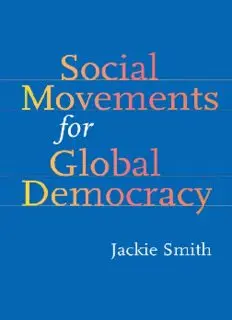
Social Movements for Global Democracy (Themes in Global Social Change) PDF
Preview Social Movements for Global Democracy (Themes in Global Social Change)
Social Movements for Global Democracy themes in global social change Series Editor Christopher Chase-Dunn Consulting Editors Janet Lippman Abu-Lughod Giovanni Arrighi Jonathan Friedman Keith Griffin Social Movements for Global Democracy jackie smith The Johns Hopkins University Press Baltimore © 2008 The Johns Hopkins University Press All rights reserved. Published 2008 Printed in the United States of America on acid-free paper 2 4 6 8 9 7 5 3 1 The Johns Hopkins University Press 2715 North Charles Street Baltimore, Maryland 21218-4363 www.press.jhu.edu Library of Congress Cataloging-in-Publication Data Smith, Jackie, 1968– Social Movements for Global Democracy / Jackie Smith. p. cm. Includes bibliographical references and index. isbn-13: 978-0-8018-8743-7 (hardcover alk. paper) isbn-13: 978-0-8018-8744-4 (pbk. : alk. paper) isbn-10: 0-8018-8743-7 (hardcover alk. paper) isbn-10: 0-8018-8744-5 (pbk. : alk. paper) 1. Social movements. 2. Globalization. I. Title. hn17.5.s586 2008 327—dc22 2007024502 A catalog record for this book is available from the British Library. Special discounts are available for bulk purchases of this book. For more information, please contact Special Sales at 410-516-6936 or [email protected]. contents List of Tables and Figures vii Preface ix part i foundations 1 Contested Globalizations 3 2 Rival Transnational Networks 19 3 Politics in a Global System 36 part ii rival networks examined 4 Globalizing Capitalism: The Transnational Neoliberal Network in Action 65 5 Promoting Multilateralism: Social Movements and the UN System 89 6 Mobilizing a Transnational Network for Democratic Globalization 108 part iii struggles for multilateralism and global democracy 7 Agenda Setting in a Global Polity 133 8 Domesticating International Human Rights Norms 158 vi Contents 9 Confronting Contradictions between Multilateral Economic Institutions and the UN System 177 10 Alternative Political Spaces: The World Social Forum Process and “Globalization from Below” 199 Conclusion: Network Politics and Global Democracy 226 Notes 243 References 255 Index 281 tables and figures tables 1.1. Neoliberal and Democratic Globalizers 6 2.1. Fractions of the Transnational Capitalist Class 24 4.1. Corporate Strategies to Undermine International Public Agencies 75 5.1. Historical Shifts in Transnational Activism 94 5.2. “Generational” Shifts in Movement–UN System Relations 97 6.1. Transnational Mobilizing Structures 112 6.2. Mobilizing Structures and Divisions of Labor in the “Battle of Seattle” 115 6.3. Transnational Networks, Coalitions, and Movements 119 6.4. Issue Focus of TSMOs, 1963, 1983, 2003 123 6.5. Changes in TSMO Network Ties, 1973–2003 124 6.6. Changing Structures and “Generations” of Transnational Activism 128 9.1. Comparing International Legal Systems 181 figures 2.1. Rival Transnational Networks 21 6.1. Growth of Transnational Social Movement Organizations 122 7.1. Overlapping Agendas 139 This page intentionally left blank preface For many, globalization refers to the increasing expansion of global markets and the subordination of national economies to a global free market system. This vision of globalization, known as neoliberalism, is presented as the only way toward progress and development. As former British prime minister Mar- garet Thatcher claimed, “there is no alternative” to economic globalization. But citizens’ groups and their allies have long demanded a completely different vi- sion of global integration—one that begins not with markets but with human beings. They have worked to build democratic structures to govern markets, making them responsive to social needs rather than to the laws of supply and de- mand. This book documents some of these struggles to build a more democratic and humane world, demonstrating how contemporary activism for global justice builds upon a rich history of transnational political action. A more just and peaceful world requires more effective cooperation among those who support a democratic vision of globalization. It also requires greater attention to questions about how global institutions can be transformed to better serve the interests of all of the world’s people. I am increasingly convinced that people who want a democratic, peaceful, and environmentally sustainable world must devote greater attention to the work of both strengthening and democratiz- ing the UN system. By neglecting the UN, democratic globalizers relinquish a key resource and ally in the struggle to define how our world is organized. And neoliberals will continue to fill this vacuum. Achieving this will require coop- eration among a diverse array of people and organizations, and supporters of democracy must develop new ways to manage their differences so that they can work together more effectively. This book is as much a political project as an intellectual one. It takes sides in favor of pro-democracy forces. Given the enormous inequalities of our day, I find it hard to even fathom the notion that any scholar might want to remain a
